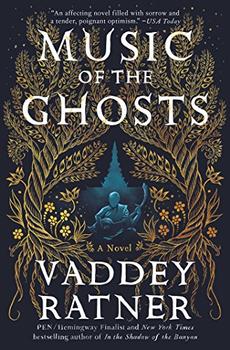Summary | Excerpt | Reading Guide | Discuss | Reviews | Beyond the Book | Readalikes | Genres & Themes | Author Bio

He feels his way in the confined space of the wooden cottage, hands groping in the dark, searching among the shadows through the blurred vision of his one good eye for the sadiev. The lute has called out to him in his dream, plucking its way persistently into his consciousness, until he's awake, aware of its presence beside him. His fingers find the instrument. It lies aslant on the bamboo bed, deeply reposed in its dreamlessness. His fingers inadvertently brush against the single copper string, coaxing a soft ktock, similar to the click of a baby's tongue. The Old Musician is almost blind, his left eye damaged long ago by a bludgeon and his right by age. He relies much on his senses to see, and now he sees her, feels her presence, not as a ghostly apparition overwhelming the tiny space of his cottage, nor as a thought occupying his mind, but as a longing on the verge of utterance, incarnation. He feels her move toward him. She who will inherit the sadiev, this ancient instrument used to invoke the spirits of the dead, as if in that solitary note, he has called her to him.
He lifts the lute to his chest, rousing it from its muted sleep, holding it as he often held his small daughter a lifetime ago, her heart against his heart, her tiny head resting on his shoulder. Of all that he's tried to forget, he allows himself, without reservation, without guilt, the reprieve of this one memory. The curve of her neck against his, paired in the concave and convex of tenderness, as if they were two organs of a single anatomy.
Why are you so soft? he'd ask, and always she'd exclaim, Because I have spinning moonlets! He'd laugh then at the sagacity with which she articulated her illogic, as if it were some scientific truth or ancient wisdom whose profound meaning eluded him. Later, at an age when she could've explained the mystery of her pronouncement, he reminded her of those words, but she'd forgotten she'd even uttered them. Oh, Papa, I'm not a baby anymore. She spoke with a maturity that pierced him to the core. She might as well have said, Oh, Papa, I don't need you anymore. Her eyes, he remembers, took on the detachment of one who'd learned to live with her abandonment, and he grieved her lost innocence, yearned for his baby girl, for the complete trust with which she'd once regarded him.
Something fluid and irrepressible rushes from deep within him and pools behind his eyes. He tries pushing it back. He can't allow himself the consolation of such emotion. Sorrow is the entitlement of the inculpable. He has no claim on it, no right to grief. After all, what has he lost? Nothing. Nothing he wasn't willing to give up then. Still, he can't help but feel it, whatever it may be, sorrow or repentance. It flows out of him, like the season's accumulated rain, meandering through the gorges and gullies of his disfigured face, cutting deeper into the geography of his guilt.
He runs his fingertips along the thin ridge, where the lesion has long healed. The scar, a shade lighter than the rest of his brown skin, extends crosswise from the bridge of his nose to his lower left cheek, giving the impression of two conjoined countenances, the left half dominated by his cataract eye, the right by smaller grooves and slash marks.
If his daughter saw him now, would she compare the jaggedness of his face to the surface of the moon? How would she describe the crudeness of his appearance? Would she see poetry in it? Find some consolably mysterious expression for its irreparable ruin? He never did make the connection between the softness of her skin and her imaginary moonlets. Now he is left to guess she probably associated the distant velvety appearance of the full moon with the caress of sleep, the lure of dreams that causes one's body to relax and soften. But even this is too rational a deduction, for he cannot trust his memories of the full moon to make such a leap. The last moon he saw clearly was more than two decades ago, the evening Sokhon died in Slak Daek, one among many of Pol Pot's secret security prisons across the country, each known only by their coded euphemism as sala. School. That evening, at Sala Slak Daek, the moon was bathed not in gentle porous light but in the glaring hue of Sokhon's blood. Blood that now tinges his one-eyed vision and sometimes alters the tone and texture of his memories, the truth.
From MUSIC OF THE GHOSTS by Vaddey Ratner. Copyright c 2017 by Vaddey Ratner. Reprinted by permission of Touchstone, an Imprint of Simon & Schuster, Inc.
Finishing second in the Olympics gets you silver. Finishing second in politics gets you oblivion.
Click Here to find out who said this, as well as discovering other famous literary quotes!
Your guide toexceptional books
BookBrowse seeks out and recommends the best in contemporary fiction and nonfiction—books that not only engage and entertain but also deepen our understanding of ourselves and the world around us.